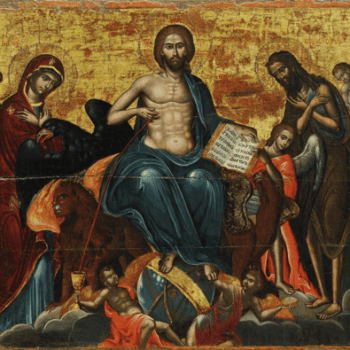
Throughout history, Christian worship and discipline changed to meet the needs of the needs of the people. At different times and places, people had their own unique needs. Change is necessary. While there is much we can and should learn from the past, we must also realize, as Jesus said, we must not put new wine in old wineskins (cf. Mk. 2:22). We want the wine, but we must provide our own wineskins, making sure Christian practices fit with the needs of today and not of the past. We want the wine, and so when we study and learn from the past, what we should grasp for is the wine, that is, the principles which remain the same throughout time, but we must take them and use them to meet our own experiences today.
While we can’t imitate or recreate the past, we can and should learn from it, taking what is good and true and applying it in our current context. Early Christian worship, for example, was closed off from the world at large. This was done, in part, to protect Christians from Roman authorities and others who wished them harm. They could not afford to welcome everyone to their churches. They needed to stay in hiding. Likewise, their services were divided into two different parts, the reading and interpretation of Scripture, and the eucharistic liturgy. Not all who were welcome in the first part of the service were allowed to stay and participate in the second. Catechumens, those undergoing penance for serious offenses, those who were seen as being affected by demonic presences (so long as the demonic influence was ascertainable) were told to depart. The doors to the churches were locked. Then, those who remained, the faithful would continue with the service and receive the greatest mystery of the faith, the eucharist. The eucharist was not held as some kind of reward for those who were perfect, but it was also not given out lightly. The question was not whether or not someone was worthy to receive but whether or not they were of the same faith as well as not being someone so spiritually sick they needed other spiritual graces instead. Confession was not routine, and serious sins and defects of faith were understood as grave spiritual sicknesses which needed special remedies to cure. As long as one was extremely sick, it was feared that they could spread their sickness to others if they were brought into communion (cf. Gal. 5:9). Direct actions, formal and grave evil, brought about that sickness: robbing someone, killing someone (no matter what the reason was),[1] apostatizing from the faith, and similar such activities required such special healing, similar to the way we realize some people with highly contagious diseases need to be isolated until they are cured.
Things are much different today. Discipline has changed as the needs and the resources of the Christian community have changed. Christians are no longer in hiding. Worship services can happen every day. Christians do not have to fear outsiders. Anyone who goes to one of our services can stay for the whole service. We do not, moreover, have infrequent confession, as was the case with the early church, so many of our sins, even our grave ones, are dealt with in a different manner. Just as many of us take daily medicine to deal with various health concerns, so confession has become a spiritual medicine which allows for lesser but more frequent penances which work to keep our souls healthy. As confession is now private, instead of public, we do not know the spiritual health of those around us, nor is it our duty to judge. The church, however, accepts that this frequent confession, even if it is not done by all, works to protect the community, serving, as it were, as a vaccine against sin. Just as a vaccine helps stop the spread of a communicable disease, so frequent confession helps inoculate a community against sin, even for those who do not partake of confession as frequently as others. This, then, explains why the church feels secure and is capable of having a far more open, far more welcoming communion, than it did before.
This is not to say there cannot be times in which someone should be denied communion. For example, those who have apostatized from the faith should not receive the eucharist. This is not about worthiness, per se, as some who apostatizes can otherwise be fine, upstanding persons in secular society, being more moral and upright than many of those who take communion; it is an issue of what receiving communion is about, which is joining together and coming together in a unity of faith and love through the real presence of Christ. If someone does not truly share our faith with us, receiving communion is dangerous for them, because they are effectively lying as they receive it; in doing so, they fight against the very meaning and intention of communion. But can we judge anyone’s faith? Do we know what they believe? Unless they vocalize it, we do not, and so we must trust them if they come to receive and do not indicate any lack of faith.
We might also want to consider whether or not others who seriously wound the community, such as clergy involved in sexual abuse, should be allowed communion. Their disease is such that it might be best for them, and the community at large, to engage a penance for the rest of their life which includes barring them from communion, similar to the way people with highly contagious and life-threatening diseases are quarantined (with the exception that, in situations where it seems they might soon face death, and they have shown a willingness and desire to be corrected and healed from their spiritual infirmities, that restriction might be lifted and they might be allowed to receive communion once again). If we do this, we must of course, learn from the early practices of the faith and understand that we do this out of love, hoping to heal the wounds of sin in them as well as protect the rest of the community from spiritual harm. We must see it as an act of mercy and spiritual healing. What we must not do, however, is use communion to fight culture wars, to engage politics, by acting as if remote material cooperation with sin is the same thing as the sin itself, and suggest that there is a sense of unworthiness based, not upon actions we have done, but actions which others have done who we have some remote connection to. Such an attitude misunderstands what communion is about; we are all, in our own lives, unworthy of it, and so if we judge worthiness based upon such criteria we will find no one will be able to receive as we will all have some remote material cooperation within sin.
The church has changed its practices over time. Its praxis must meet the needs of the people. The Sabbath is meant for the people, not the people for the Sabbath. We must keep this in mind, as the church continues to develop disciplines to meet the contexts it finds itself in. The church can be, and is, more open in its worship. It has the resources it needs in order to encourage the faithful to receive the sacraments frequently, which it did not do in the past because it often did not have enough ordained clergy to provide everyone the sacraments more than once a year (if even that). If this changes, then our disciplines will once again change. We must always be willing to adapt. We must always receive the wine while making new wineskins to put it in.
[1] St. Basil, for example, wrote: “He who unintentionally killed someone shall not partake of the Blessed Sacrament for ten years,” St. Basil, “Letter 217” in Saint Basil: Letter. Volume 2 (186-368). Trans. Agnes Clare Way, CDP (New York: Fathers of the Church, 1955).
Stay in touch! Like A Little Bit of Nothing on Facebook.
If you liked what you read, please consider sharing it with your friends and family!












